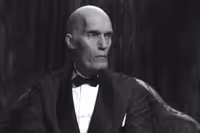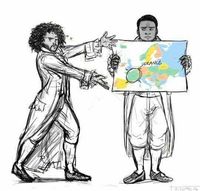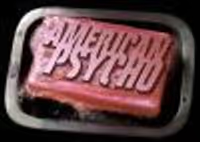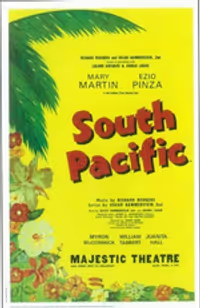Straight men playing gay men
Gizmo6
Broadway Star Joined: 6/16/17
#25Straight men playing gay men
Posted: 6/5/18 at 7:19pm
ScottyDoesn'tKnow2 said: "Certain LGBTQ storieshave been told (not much in the way of trans actually but that's consistent with real life) and they are sort of from the same demographic and some times it feels like they all have one voice (they don't but that's what happens with they dominate the story). There's way more stories to tell from LGBTQ authors and characters from different points of views and areas of life that Broadway has not explored yet. One reasonFun Homein 2015 was such a revelation was because it hit so many new notes with the telling of a woman'shistory grappling with her sexuality, meeting gender standards, and her father's sexuality. Although the story of coming out or being "gay" has been tackled on Broadway before, it was never really tackled from that perspective with a butch lesbian being the main character."
This 100% Lesbian stories are completely underrepresented
Fun Home was a revelation and I can’t wait to see it again in London
#26Straight men playing gay men
Posted: 6/5/18 at 7:19pm
"....straight dudes snatching gay roles didn’t really bother any of us. But why?"
Because luckily most people understand that victimizing certain groups will exclude them and create a separation. These kind of remarks are the core of the problem.
No matter how much you would like to put gay people in a victim role, the beginning of equality is accepting that every actor can play any desire.
#27Straight men playing gay men
Posted: 6/5/18 at 7:20pm
Gizmo6 said: "
It’s actually a perfect term as it equates race with sexuality, as something inherent to the person and not something that can be put on or taken off."
I understand your side of the argument and that's a good point. I guess I wouldn't mind the term "gay face" if used in a slightly different way than "insert color" face: If a heterosexual person was acting stereotypically homosexual in their real life (such as at an audition) because they think there is a higher likelihood of getting the outcome they want... that's when I'd call Gay Face.
#28Straight men playing gay men
Posted: 6/5/18 at 7:22pm
For what it's worth, hasn't Andrew Garfield come out as sexually fluid?
(Also for what it's worth, I know there are varying opinions on this, but I thought his performance was one of the best performances I've seen in my life.)
The entire point is that it's acting. If we start to dictate that actors need to specifically represent the characters they're playing, it's a very, very slippery slope.
#29Straight men playing gay men
Posted: 6/5/18 at 7:23pm
ScottyDoesn'tKnow2 said: "Portraying gay men of different ages, body types, places where they are from, different socio-economicbackgrounds, different adult lives, different races, different interests, passions, etc. than is what usually portrayed on Broadway...also stories having different character arcs, different stories being told, having them actually be the main character, etc."
I agree. If I ever see a show with a gay character, it's usually a stereotypical representation. But that's what America only knows. They can't get out of that mindset. They haven't for years and Hollywood and Broadway aren't doing much to change that.
Most gay stories in the mainstream are coming out stories or men in dresses. But are you looking for a show with a male lead who happens to be gay and the story is about something else? Or are you looking for a gay story with a gay male that isn't the stereotype we usually we in hollywood or broadway?
#30Straight men playing gay men
Posted: 6/5/18 at 7:31pm
Gizmo6 said: "Sondheimite said: "Equating the ludicrous idea of "gay face" to, by using the name "gay face", to black/yellow/red/brown face that white actors used to but on (and still do in community theatre productions of The King and I all over America) is a little... upsetting and off base while boarding on downright demeaning to the actual problem of white people playing people of color."
It’s actually a perfect term as it equates race with sexuality, as something inherent to the person and not something that can be put on or taken off."
It's not appropriate to equate "gay face" ( god i dont even wanna say the word) to black face or brownface or yellowface. It's just not appropriate.
ScottyDoesn'tKnow2
Broadway Legend Joined: 1/22/14
#31Straight men playing gay men
Posted: 6/5/18 at 7:34pm
Those are interesting questions. I admit I can't fully express what I really want. I just know that I love Broadway, I love theatre, and I love past stories that have had LGBTQ characters because every piece of representation is important especially if it's coming from a LGBTQ person or at least somebody who is treating the community with real respect. I just think that when I really think about it, I can't say I really relate to many of the popular works that people cite to have gay men represented no matter how much I may enjoy it. I don't think a gay man should be celibate or not have a story involving his romantic life nor do I think we should erase femme stories and portrayals or men in dresses either because they are real and valid and are already targeted by some in our community for erasure. I just think a gay story can be gay and be portrayed as real and dealing with many of the popular subjects that usually comes with telling a "gay story" while also dealing with something else entirely and choosing other stories that have not yet been told just featuring a gay person who is also going through things. I mean theatre can do that and can recognize people have so many things that shape their lives all at once and people react to different aspects of their personality/identity, etc.
Anyway, when I first heard the term "gay face" I thought it meant when straight actors all of a sudden put on this mask playing a gay character and gave him expressions and mannerisms that he, as a straight person, thinks a gay person is like. Like all of a sudden, he puts his gay mask on and the portrayal is as deep as putting a mask on. The exaggerations get a little bit more flamboyant and the wrists get a little more limp and the voice goes up an octave. Sometimes it's subtle but it's there.
robskynyc
Broadway Star Joined: 4/17/18
#32Straight men playing gay men
Posted: 6/5/18 at 7:37pm
RicardoMagon said: "The real problem that I see in theater is most gay characters in theater are written as stereotypical flaming will and grace type crap. Writers should do a better job at depicting people who happen to be gay, rather than forcing down the tired stereotype."
THIS!
And not just theatre, but movies and TV as well. Love Simon was a step in the right direction.
#33Straight men playing gay men
Posted: 6/5/18 at 7:43pm
Sondheimite said: "If a heterosexual person was acting stereotypically homosexual in their real life (such as at an audition) because they think there is a higher likelihood of getting the outcome they want... that's when I'd call Gay Face."
We could argue that a gay person acting stereotypically heterosexual is "Straight face" then.
People who do not understand this and insist on putting gay people in the victim role and want to maintain a separation are in the wrong here. Equality starts where thinking in a 2 way street begins.
Also, when it comes to casting it is all about believability. A gay actor can play a straight character and a straight actor can play a gay character in my opinion when it's believable. So that should always be a 2 way street.
There is a difference in what works and what does not work in portrayal though. Most gay people would agree that a gay character played in a straight manner is not a problem, because they like to see gay characters represented in a non stereotypical way. But if a straight character is played by someone with gay mannerisms, it doesn't work well in my opinion.
So that means that basically every straight actor could play a gay character, (like I said, because gay characters coming across as straight is accepted) but not vice versa. Which makes it very logical that many gay characters are portrayed by straight actors.
We have to ask ourselves, is it about what we like to see portrayed or about how many gay people get a job?
#34Straight men playing gay men
Posted: 6/5/18 at 7:47pm
I also think that if we are bring this topic up, we should also address the rampant racism in the gay community. The small amount of gay friends I have also happen to be people of color and they're always telling me about seeing "only whites" " no asians" "no blacks" "No Mexicans" on gay apps and such.
I also see it on the apps I use like Tindr and others.
As a person of color I think I can speak for all people of color when i say: WE'RE FREAKING SICK OF IT.
Personally, I think if someone thinks they can't find a handful of people from every race sexy then they need to get out of their basement or out of their state and see the country. But even if you do believe that some races aren't attractive, then why do you have to post it so bullishly? Why do you have to be so mean about it? Seeing banners like that on apps never gets easier for people like me
Rainah
Broadway Star Joined: 11/24/16
#35Straight men playing gay men
Posted: 6/5/18 at 7:49pm
- I am 90% sure that Andrew Garfield is not straight
- Queer actors can bring a depth of understanding and real life experience to queer roles that straight actors cannot
- the more a story is about being queer (as opposed to a character who has a separate story and just happens to be queer) the more important it is to cast a queer actor
- It's discouraging as hell when, as a queer person, every single actor you see playing a queer character is straight. It does feel like you're excluded from your community
That is what I hold as a good rule of thumb. Nowhere do I say that all queer roles must always be played by queer actors. At the same time, there are times when I think it's not the right choice, and when in aggregate it's almost always a straight actor, that has impact. I don't think there can be hard and fast rules. It is a grey area.
And no, I don't think "gayface" is appropriate, because the queer community faces different struggles and different legacies than poc communities. I understand the urge to say "We all face struggles and here are some similarities" but poc are understandably very protective of their own legacies and it can be touchy.
#36Straight men playing gay men
Posted: 6/5/18 at 7:54pm
Rainah, so what is the right path in your opinion? That people fill out a form on an audition, stating their sexuality? And being put in different rooms because of it?
Is that your idea of the key to less separation?
JBC3
Broadway Star Joined: 4/9/17
#37Straight men playing gay men
Posted: 6/5/18 at 7:58pm
I most want a well-acted performance.
Depending on the individual, the role, and the show, the sexual orientation of the actor may or may not be a critical variable for producing that performance.
BWAY Baby2
Broadway Star Joined: 11/10/14
#40Straight men playing gay men
Posted: 6/5/18 at 8:07pm
Cynthia Nixon was great in Sex And The City- Tom Hanks was great in Philadelphia- end of that discussion for me- believability is the only impediment to playing a role.
TexanAddams18
Featured Actor Joined: 7/19/11
#41Straight men playing gay men
Posted: 6/5/18 at 8:11pm
BWAY Baby2 said: "Cynthia Nixon was great in Sex And The City- Tom Hanks was great in Philadelphia- end of that discussion for me- believability is the only impediment to playing a role."
Gavin Creel was great and believable in Dolly, And won the Tony (for the person who said they don't award that)
Gizmo6
Broadway Star Joined: 6/16/17
#42Straight men playing gay men
Posted: 6/5/18 at 8:19pm
BWAY Baby2 said: "Cynthia Nixon was great in Sex And The City- Tom Hanks was great in Philadelphia- end of that discussion for me- believability is the only impediment to playing a role."
But can you not delve a little deeper beyond the shallowness of believability.
Brokeback Mountain with two openly gay actors would have been too dangerous. Not dangerous in the violent sense but in the insidious promotion of homosexuality. When audiences are watching straight actors by gay they are not thinking about sex, they are safe in the knowledge the actor is straight when they watch gay actors that’s all they will see if producers permit them to see.
There’s a systematic system of oppression while almost eradicated still has
some fight left and perople should be able to recognise that and how it operates.
Gizmo6
Broadway Star Joined: 6/16/17
#43Straight men playing gay men
Posted: 6/5/18 at 8:22pm
TexanAddams18 said: "BWAY Baby2 said: "Cynthia Nixon was great in Sex And The City- Tom Hanks was great in Philadelphia- end of that discussion for me- believability is the only impediment to playing a role."
Gavin Creel was great and believable in Dolly, And won the Tony (for the person who said they don't award that)"
I was taking about awards like for Hanks and Ledger and Leto
for example.
#44Straight men playing gay men
Posted: 6/5/18 at 8:37pm
This argument is looking through a very recent modern lens, though. If you read the thread about the original Cowboy in Boys in the Band, he was straight and could barely get work after doing Boys, since everyone couldn't see him as anything beyond a gay hustler. So, there has been a ****ton of progress to get to the point where this can even be a legitimate whinge.
And you used to need bankable name stars (which usually meant straight) to get a project off the ground. Even when this debate came up with regard to casting a trans actor as Hedwig, it devolves when you ask what trans actor/actress is a big enough name to get producers to line up and hand over millions of dollars?
#45Straight men playing gay men
Posted: 6/5/18 at 8:52pm
I agree that gay actors have a bit of a hard time sharing their voices (especially if they're not a thin, young, white twink), but I think casting based on the sexual orientation of the actor is problematic. I don't think Garfield identifies as "straight" and I find that this argument kind of erases those who are queer or fluid, but not "gay." Also, all of the other men in Angels are gay as well as Malone. I just find that whole argument a little strange. I would understand it if all of the actors in the show were completely straight men playing gay, but that isn't what's going on.
Also, yeah. I find it pretty offensive that people feel that a sexual fluid actor playing a gay man (and giving a brilliant performance btw) is equal to blackface or yellowface. Sorry, but no.
teatime2
Featured Actor Joined: 3/25/18
#46Straight men playing gay men
Posted: 6/5/18 at 8:52pm
I have a few opinions on this. Often times when straight actors play gay roles they rely on stereotypes to read "gay". If they need to do that should they be cast in the first place? Then it's another issue of a straight person giving life to something they shouldn't have right to give life to in the first place. Most of the gay roles in theater as a whole are based off of stereotypes. The ones based off of stereotypes are the ones where you'll find gay actors in. The roles that are just people who happen to be gay are always the straight guys. I'm happy Lee Pace is talking about how it is important to have gay actors in gay roles. I believe that should be a given thing.
Updated On: 6/5/18 at 08:52 PM#47Straight men playing gay men
Posted: 6/5/18 at 8:54pm
I thought being an actor included playing characters quite different than yourself so the simple answer IMO is yes.
#48Straight men playing gay men
Posted: 6/5/18 at 9:06pm
JudyDenmark said: "For what it's worth, hasn't Andrew Garfield come out as sexually fluid?"
He said he was heterosexual but has "an openness to impulses."
#49Straight men playing gay men
Posted: 6/5/18 at 9:11pm
Tony Kushner and Andrew Garfield address this topic in their interview with Christiane Amanpour. Short version - Garfield says it’s a very important discussion to have, and Tony (the gay playwright) wanted him to do this play and that’s enough for him.
Kushner says “the idea of asking an actor who they sleep with before I cast them is repellent to me, I would never do that, I don’t even think it’s legal, it shouldn’t be legal. It’s none of my d*** business… if they can do it, their sexual orientation, their political preferences, none of that is any of my business. This is a profession and I work with actors, I need to work with the best actors I can get. So he’s one of the best actors alive and this is a very big, difficult part, and as a gay man I’m enormously moved by … I’ve never seen any straight man perform a gay character with more intimate knowledge, and things in Andrew’s performance that you usually can only see in gay men. but that’s the miracle of the empathic imagination, that’s what actors do. I can learn from having the story of my tribes (Jews or gay people or Americans) told by people who are not that.”
Full interview here. This topic starts about 20 minutes in.
https://www.pbs.org/video/amanpour-tony-kushner-and-andrew-garfield-mh7oqs/
Videos









